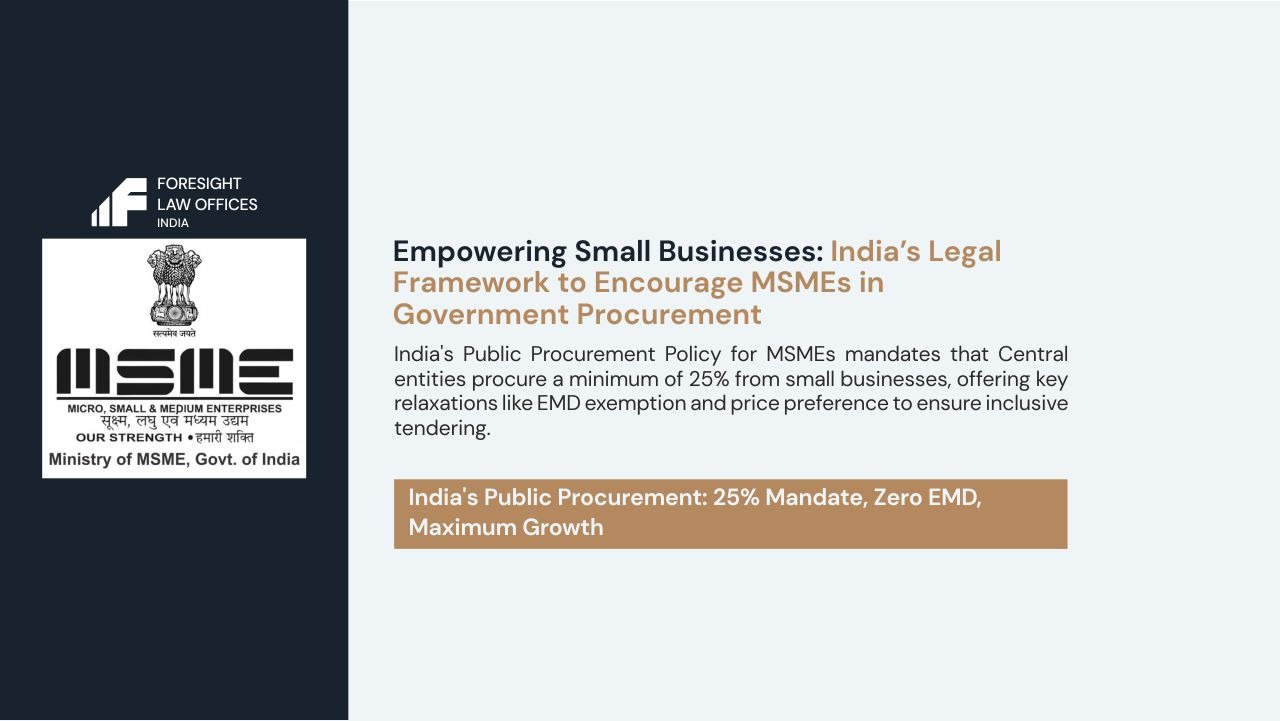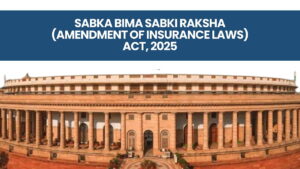The public procurement market, where the government purchases goods, services, and works, is the single largest customer in any modern economy. In India, this market is vast, offering an immense and reliable source of business for the corporate sector. Yet, for decades, Micro, Small, and Medium Enterprises (MSMEs), the backbone of the nation’s economy, generating employment next only to agriculture, found themselves marginalized. Large enterprises, with their deep pockets and extensive experience, often dominated the bidding process, leaving MSMEs struggling to meet stringent financial and technical criteria.
Recognizing this fundamental barrier, the Government of India introduced a powerful legal and policy framework to level the playing field. These mechanisms, primarily driven by the Micro, Small and Medium Enterprises Development (MSMED) Act, 2006, and the subsequent Public Procurement Policy for Micro and Small Enterprises (MSEs) Order, 2012 (and its amendments), fundamentally reshaped how government contracts are awarded. This analysis delves into the specific legal tools, mandatory set-asides, financial relaxations, and procedural simplifications, that now act as the legal scaffolding for MSME inclusion.
The Mandate: Legal Obligation Through Set-Asides
The most potent legal tool introduced to ensure MSME participation is the principle of mandatory procurement targets, often referred to as a set-aside policy. This is not merely a recommendation; it is a statutory obligation on every Central Ministry, Department, and Public Sector Undertaking (PSU).
1. The 25% Mandatory Procurement Target
The core provision of the Public Procurement Policy for MSEs (as amended) mandates that every procuring entity must set an annual goal to source a minimum of 25% of its total annual value of goods and services from the MSME sector.
- Statutory Duty, Not a Discretionary Choice: This 25% target transforms the policy into a binding directive. The Supreme Court has repeatedly affirmed that while an individual MSME cannot claim a direct right to a contract share, the procuring authority is under a clear statutory duty to make sincere efforts to meet this collective target.
- Sub-Targets for Inclusive Growth: To promote social equity and entrepreneurship among marginalized groups, the 25% target is further broken down:
- 4% of the total annual procurement from MSMEs must be sourced from MSMEs owned by Scheduled Caste/Scheduled Tribe (SC/ST) entrepreneurs.
- 3% of the total annual procurement from MSMEs must be sourced from MSMEs owned by Women entrepreneurs.
This tiered set-aside system ensures that the economic benefits of public spending are directed towards achieving broader socio-economic goals, establishing a legal framework for affirmative action in procurement.
2. Reservation of Items for Exclusive Purchase
Another direct set-aside mechanism involves the reservation of specific goods and services. The policy identifies a list of items (originally 358 items) that are reserved for exclusive procurement from the MSME sector. For these items, large-scale bidders are legally barred from participating in the tender, creating a secure market segment for small enterprises. This mechanism is crucial for traditional industries and local manufacturing, shielding MSMEs from direct competition with big players in their specific niches.
Leveling the Field: Financial and Technical Relaxations
The primary deterrent for MSMEs in tendering has historically been the demand for significant working capital and decades of prior experience. Indian law addresses this directly by simplifying procedures and providing crucial relaxations.
1. Exemption from Earnest Money Deposit (EMD)
In almost all government tenders, bidders are required to submit an Earnest Money Deposit (EMD) or Bid Security, a refundable deposit that ensures the bidder’s seriousness and commitment. For an MSME with limited working capital, locking up this money for months can be prohibitive.
The legal framework grants all MSMEs registered under the relevant schemes (like Udyam Registration) a complete exemption from paying EMD/Bid Security. This single provision significantly lowers the barrier to entry, freeing up the MSME’s capital for business operations rather than tying it up in a security deposit.
2. Relaxation in Prior Turnover and Experience Criteria
Procuring entities often impose high minimum financial turnover and prior work experience requirements to filter out unqualified firms. These requirements are frequently disproportionate and legally challengeable if they are excessive.
The policy mandates that procuring entities must grant relaxations in the criteria for Prior Turnover and Prior Experience for MSMEs, provided the enterprise meets the technical specifications of the product or service itself. This relaxation is particularly critical for:
- Start-ups: DPIIT-recognized start-ups are explicitly granted exemptions from criteria like Prior Experience and Prior Turnover, enabling them to introduce innovation into government supply chains without the burden of a long track record.
- Emerging Businesses: It allows technically capable, but new, MSMEs to compete on their actual capability rather than their historical revenue, aligning procurement with national growth goals.
3. Price Preference Mechanism
The law provides a mechanism that allows MSMEs to secure a contract even if their quoted price is slightly higher than the lowest bid (L1).
- The L1 + 15% Band: In a tender where the lowest bidder (L1) is a non-MSME firm, if an eligible MSME quotes a price within the range of L1 + 15%, the MSME is given the chance to match the L1 price.
- Assured Supply Share: If the MSME matches the L1 price, the MSME is then permitted to supply at least 25% of the total tendered quantity (or full quantity if the contract is non-divisible).
This system provides a decisive commercial edge to MSMEs, effectively subsidizing their participation and incentivizing them to compete robustly.
The Digital Conduit: GeM and Procedural Simplifications
Beyond direct financial and set-aside benefits, the government has used technology and procedural law to make the tendering process itself more accessible to small businesses.
1. The Government e-Marketplace (GeM)
The introduction of the Government e-Marketplace (GeM) is a major legal and procedural reform. GeM acts as a dedicated, fully transparent, and digitized online platform for all government procurement.
- Transparency and Discoverability: By centralizing procurement, GeM ensures that every MSME has real-time, equal access to all Central Government and PSU tenders, eliminating the information asymmetry that once favored large firms.
- Automated Compliances: The platform automates many compliance checks and incorporates MSME relaxations directly into the bidding process, significantly simplifying the administrative burden on small firms.
2. Free Tender Documents and Payment Timelines
Registered MSMEs are legally entitled to obtain tender documents free of cost, saving them upfront administrative fees. Furthermore, the MSMED Act includes a powerful legal provision to address the chronic problem of delayed payments, which is a significant factor in MSME failure.
- 45-Day Payment Limit: The law stipulates that buyers (government departments, PSUs, etc.) must make payments to MSME suppliers within a maximum of 45 days of the supply being accepted.
- Penalty for Delay: Failure to adhere to this timeline attracts a penalty in the form of compound interest at three times the bank rate notified by the Reserve Bank of India (RBI), which can be legally enforced by the MSME through the Micro and Small Enterprises Facilitation Council. This penalty provision is a critical legal deterrent against payment delays, protecting the financial health of the small supplier.
Judicial Review and Enforcement
While the policy grants significant protections, its effectiveness relies on strict adherence by procuring agencies. The Supreme Court, in landmark judgments (such as in the case of M/s. Tecnimont Pvt. Ltd. vs. State of Punjab), has solidified the legal standing of the MSME policy.
The judiciary has affirmed that:
- The terms of the MSME Procurement Policy are legally binding.
- Procurement conditions that are arbitrary, irrational, or discriminatory and directly counteract the statutory objectives of the MSMED Act are subject to judicial review and can be struck down.
This judicial oversight ensures that procuring entities cannot defeat the purpose of the policy by drafting tender conditions that, while seemingly neutral, are in practice designed to exclude MSMEs. The burden is on the government to ensure its tender conditions align with the national policy of promoting small businesses.
A System Built for Inclusion
India’s legal framework for public procurement has moved far beyond a simple “value for money” principle. It is now a powerful tool of economic policy designed for inclusion. By introducing a mandatory 25% set-aside, providing decisive financial exemptions (like EMD waiver), giving a competitive price preference, and streamlining the process through digital platforms like GeM, the law has legally mandated the participation of MSMEs. The challenge remains in consistent implementation and enforcement, but the legal structure is clear: MSMEs are no longer passive bystanders; they are legally assured participants in the nation’s vast public market.






